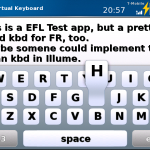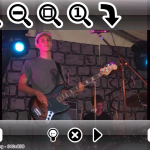This is an official PR announcement from the FOSS community.
Different translations are available here: wiki.freesmartphone.org /CZ /DE /ES /PL
Tuesday, February 15th, 2011 – Despite the recent departure of a former mobile handset manufacturer giant, several developing teams and their users are actually… happily hacking on. With the longterm goal of a fully Free Software platform for embedded systems, the teams of FSO, SHR, QtMoko, Replicant and AndroidOnFreerunner invite others to join and participate in projects which are not driven left and right by the unpredictable follies of corporate management.
«We have been making a steady progress throughout the years. The major requirement has been a solid, Linux supported hardware, and for that we have been using Openmoko, Palm Pre, N900 and HTC phones – and ambitioned forthcoming projects like Goldelico’s GTA04. All these devices are providing a great development platform for those who seek truly open and independent system for their learning, coding and even professional or commercial use.» — says Dr. Michael Lauer from FSO.
There’s a temporary advantage when big players like FIC (Openmoko), Nokia+Intel (MeeGo) and Google (Android) invest in Free Software Projects. Though if the project contains parts of proprietary code, it depends on the investor. At some point the investor might abandon the project and the community. Then the project is doomed because the community can not fix any bugs in the proprietary code or adapt it to newer/other APIs.
«We believe in another model – proven to be both sustainable and satisfactory – where everybody can contribute their knowledge and learn at the same time, without proprietary code blobs and no closed doors boardroom meetings. This allows us to use existing hardware even when the maker decided to abandon it all together or is not willing to update it anymore. Anybody is able to commit, read, comment on or download the source code.»
The teams invite both users and developers to look at their project pages, the current results, motivations and needs, as well as to join the mailing lists, wikis, forums, IRC rooms or what not, to chat, listen and eventually contribute in order to create the free and open embedded platform for their devices.
The communities of FSO, SHR, QtMoko, Replicant and Android on Freerunner



 Since a very long time there is a very annoing bug (
Since a very long time there is a very annoing bug (